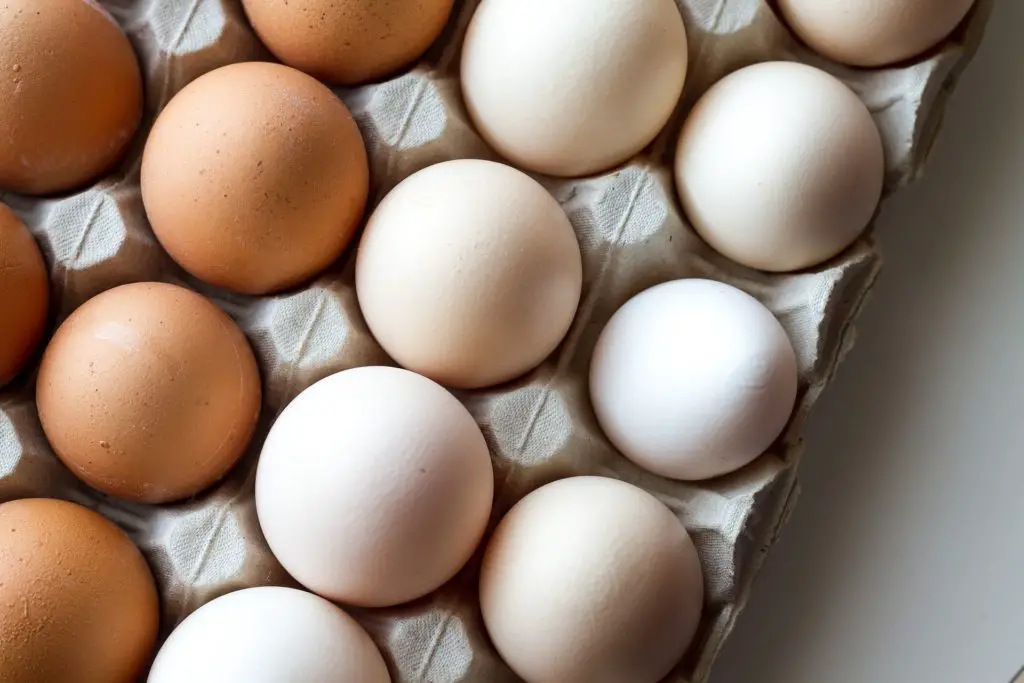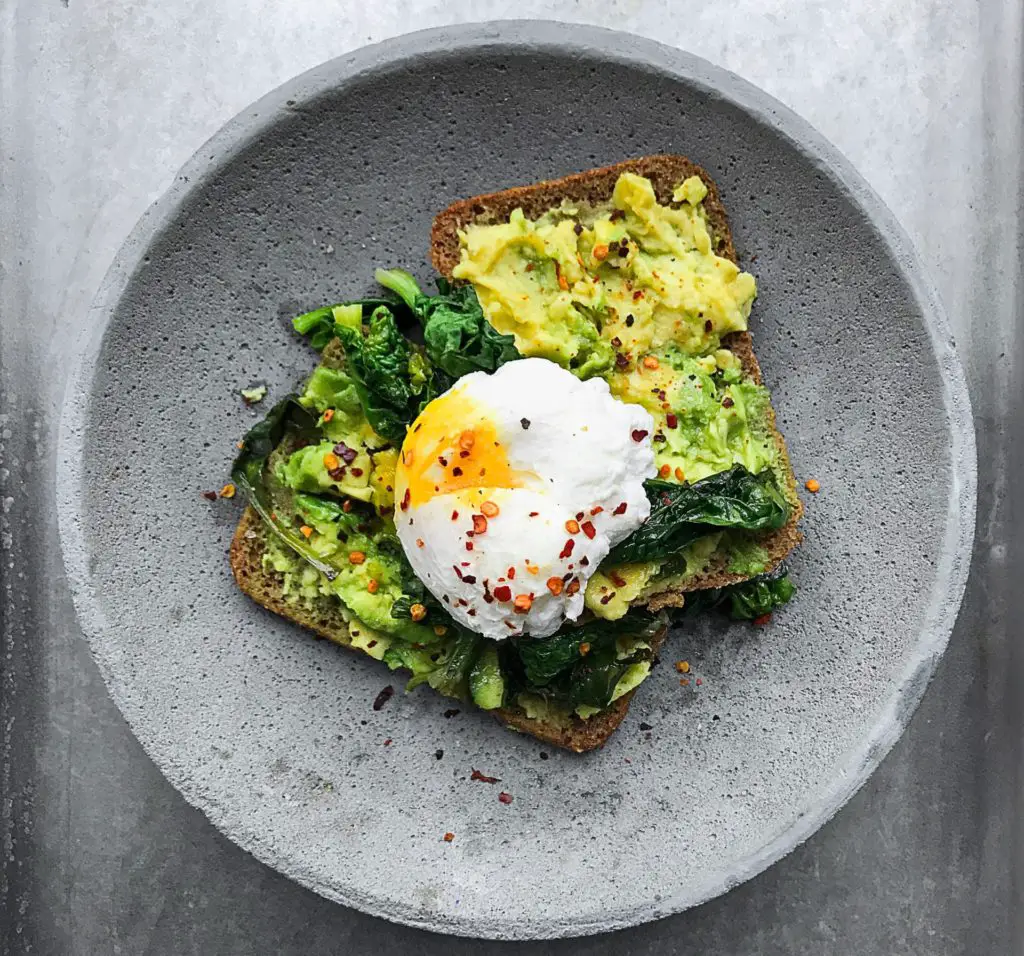Eggs are a nutritional powerhouse. They have a lot of great nutrients packaged into one small little white shell. If you needed a quick meal, eggs can provide some important nutrition. Teenagers are growing and developing and need to pay careful attention to their diets, especially the type of food they eat to start their day for breakfast.
Eggs can have a place in a teenager’s diet, in moderation. There are many benefits of eating eggs regularly, but by consuming too many there can be health consequences as well. Here are the best tips from a registered dietitian nutritionist.
Most teenagers can healthily eat about 1-3 eggs per day. If you don’t eat eggs everyday, then you should be safe consuming 3-4 eggs a couple times per week. Eggs are a low-carb, low-calorie, and low-cost meal.
One egg contains 7 grams of high quality protein, iron, riboflavin, selenium, vitamin D, vitamin B6, vitamin B12, zinc, copper, and more. Eggs also contain saturated fat and cholesterol, which might be concerning for some people if eaten in abundance.
Eggs are kind of a hot-topic in nutrition and on the internet. There is a lot of misinformation regarding eggs. Talk to a dietitian for a specific healthy eating plan related to your needs. Are eggs appropriate for your diet? Keep reading for tips on egg nutrition for your teenager’s healthiest meal plan.

How Many Eggs Should a Teenager Eat Per Day?
If you wanted a presentation about why eggs are bad for you, I could do that. If you wanted a presentation about why eggs are good for you, I could also do that. And I could teach you some pretty surprising facts either way.
There aren’t any “magical” perfect foods out there, every type of food can be good or bad depending on your health, how much you eat, when you eat it, and how often you eat it. All foods can have a place in our diet, in appropriate portions, depending on their nutrient profile and our daily food choices.
It’s still important to learn about your food choices and be informed about current research of what you are eating. Certain people have risk factors that make eggs a worse choice everyday, but for the general healthy population, eggs can be a great choice. Teenagers can safely eat a few eggs today, about 1-2.
What the Research Says About Eggs
In the past, people have limited their intake of eggs, worrying about the cholesterol in eggs causing increased blood cholesterol and risk for cardiovascular disease. Many people switched to egg-white omelettes to decrease fat and cholesterol. Recent science shows that the cholesterol in eggs isn’t as concerning and shouldn’t affect blood cholesterol. Eggs can be still be nutritional and beneficial in your diet.
Current research has interesting results regarding egg intake. One egg per day in may lead to a lower risk of heart disease and stroke and eating a dozen eggs a week does not seem to increase cardiovascular risk factors, even for those with pre-diabetes and Type 2 diabetes.
Also, the American Heart Association suggests that eating one egg per day can be part of a healthy diet.
How Many Eggs Per Day Is Too Many?
The important key is to know your risk factors. Most people can eat 1-3 eggs per day as part of a healthy diet. Those at risk for heart disease, diabetes, or have had a heart attack may need to pay closer attention to cholesterol levels and saturated fat. It’s okay to eat more eggs than that, as long as you don’t eat eggs everyday.
Since cholesterol is found in animal sources (meat, poultry, dairy, eggs), vegetarians consume a very low amount of dietary cholesterol. Vegetarians could eat more than 1-3 eggs per day, assuming they are ovo-vegetarians and still eat eggs.
There isn’t specific research that designates an unhealthy amount of eggs per day, it isn’t as widely studied. Mostly people don’t consume a dozen eggs per day. If you do, it might be worth checking in with your doctor and looking at your blood work, just to make sure.
Is it Okay to Eat Eggs Everyday?
It is okay to eat eggs everyday. If they are a favorite breakfast food, try healthier ways to prepare eggs besides frying them in fat/oil and adding a bunch of cheese. An egg omelette, hard-boiled egg, and scrambled egg can be a great breakfast or snack.
Eggs are a great meal or snack for a teenager because they are quick and easy, provide important nutrients, inexpensive, and a lot better than many popular packaged foods that teenagers tend to choose for quick snacks.
Why Are Eggs Good for Teenagers?
Many teenagers have unhealthy eating habits including skipping meals (especially breakfast), grazing constantly, eating lots of snacks and processed foods, consuming too much sugar and soft drinks, experimenting with unhealthy and unsafe fad diets, making poor food choices, not meeting fruit and vegetable recommendations, and not meeting physical activity recommendations.
Nutrient requirements during the adolescent years are high to fuel important rapid growth and development. It is crucial for teenagers to learn how to eat a well-balanced diet so they aren’t fueling their bodies with mostly sugar and saturated fat each day.
Teenagers are typically not meeting the requirements for calcium and vitamin A, iron, magnesium, etc. in their diets. Plus teens consume too much sodium, sugar, and unhealthy fats. Because of the many nutrients found in eggs, it may be helpful for some teens to consume them each day to help meet nutrient requirements.
Eggs contain tiny amounts of many crucial nutrients. Eggs are healthy when prepared in the right way, they provide important nutrients during the crucial teenage years of growth and development.

Benefit of Eating Eggs
Eggs are the total package. They are chock full of nutrients and make a simple and delicious meal. Eggs are a popular breakfast food to start your day with a boost of important nutrition. See the nutrition facts below.
Here are some of the benefits of eating eggs:
- Inexpensive
- Full of important nutrients
- Easy and quick to cook and eat
- Versatile
- Delicious
- Are very filling and help you feel full and eat less calories
- Contains high quality protein which may help with weight control, muscle mass, and blood pressure
- May help with acne symptoms
- Part of a healthy diet
- Moderate consumption may decrease risks of certain diseases such as heart disease, stroke, etc.
Nutrition in One Egg
Eggs are a nutritious golden package in a shell. Eggs have 13 essential vitamins and minerals, high-quality protein, and low calories. Here is a breakdown of the nutrition facts in one large egg:
| Calories | 72 |
| Protein | 7 grams |
| Total Fat -Saturated Fat -Polyunsaturated Fat -Monounsaturated Fat | 5 grams 1.6 grams 0.6 grams 2 grams |
| Cholesterol | 187 mg |
| Sodium | 63 mg |
| Potassium | 63 mg |
| Total Carbohydrate | 0.8 grams |
| Protein | 7 grams |
| Vitamin A | 5% DV |
| Calcium | 2% |
| Vitamin D | 11% |
| Cobalamin | 10% |
| Iron | 3% |
| Vitamin B6 | 5% |
| Magnesium | 1% |
Eggs also contain a few more important nutrients, phytochemicals, and antioxidants for beneficial health benefits, including:
- Choline– important during pregnancy and breastfeeding for fetal and infant brain development and to prevent neural tube defects.
- Lutein and Zeaxanthin– important for eye health with vitamin A, helps to prevent cataracts and macular degeneration.
- Vitamin D– essential for bone health. Vitamin D comes from the sunshine and some foods. Not many foods contain vitamin D, so eggs are an important choice.
- Leucine– essential amino acid for muscle protein synthesis
- Selenium- helps prevent cell damage and plays a role in metabolism
- Riboflavin- helps the body with energy production and growth
- Vitamin B12- important for nerve and blood cell health, brain function, and producing red blood cells
- Phosphorus- forms bones and teeth, helps with energy metabolism and many body functions
- Folate- important for blood cell formation, energy metabolism, and DNA/RNA production. Very important for periods of growth such as pregnancy, infancy, and adolescence.

What is the Healthiest Part of the Egg? The Yellow Egg Yolk or the Egg White?
Because egg yolks contain cholesterol and more calories, many people choose to eat only egg whites. It might not always be worth it to ditch the yolk. Check it out:
Egg Yolk and Egg White Nutrition Difference:
| Egg White | Egg Yolk | |
| Calories | 17 | 55 |
| Total Fat Saturated Fat | 0.1 g 0 g | 4.5 g 1.6 g |
| Cholesterol | 0 mg | 187 mg |
| Sodium | 55 mg | 8 mg |
| Carbohydrates | 0.2 g | 0.6 g |
| Protein | 4 g | 3 g |
You can see that the egg yolk contains more cholesterol, fat, and calories than the egg white, so easy choice, right? Not so fast! It’s important to remember that the egg yolk contains most of the egg’s nutrients. The egg yolk is the most delicious and nutritious part of the egg.
The egg yolk contains all of the egg’s vitamin A, vitamin D, vitamin E, vitamin K, and healthy fats, plus the egg yolk contains more calcium, iron, phosphorus, zinc, copper, manganese, selenium, thiamin, pantothenic acid, folate, vitamin B6, vitamin B12 than the egg white. When you throw away the egg yolk, you’re throwing away a lot of nutrition for a low amount of calories when you only choose to eat the egg whites.
Although, If you eat eggs in large quantities, it’s probably better to eat more egg whites. Egg whites are still healthy and beneficial. They contain more of the protein, almost zero fat, no cholesterol, and are low-calorie. Mix 2 egg whites with every whole egg you use.
Eggs and Cholesterol
For years eggs have been labeled as a “high-cholesterol” food and a bad choice, especially for those with blood cholesterol. Now we know that saturated fat has a higher effect on blood cholesterol than dietary cholesterol does. Plus, consuming eggs regularly may increase HDL cholesterol in the body (the good kind of cholesterol).
Cholesterol is essential in the body for formation of brain cells and specific hormones as well as digestive fluid. There is a difference in dietary cholesterol from food and blood cholesterol. Your liver makes cholesterol and your body can do a pretty good job of balancing how much you need.
Consumption of cholesterol has little effect on blood cholesterol. Dietary cholesterol shouldn’t be too worrisome in foods. Sugar, trans fats, saturated fats, body weight, and genetics, play a bigger role in blood cholesterol levels than cholesterol from foods.
Only animal products contain cholesterol, such as beef, chicken, pork, seafood, eggs, and dairy. If you consume extra cholesterol in the diet, your body knows to make less cholesterol. However, high blood cholesterol is a risk factor for heart disease.
Some individuals are ‘responders’ and may have increased blood cholesterol and respond more to high-cholesterol foods, check with a doctor or dietitian if you have risk factors to find out if limiting dietary cholesterol is right for you. You may be advised to limit your egg intake and foods that are high in saturated fat, trans fat, and cholesterol.
And just because you don’t have high blood cholesterol that doesn’t mean you should eat as much cholesterol as you want. It might be beneficial to stay within about 300 milligrams cholesterol per day (however, that is a previous recommendation that has since been dropped due to lack of evidence). You could healthily eat about 1-3 eggs per day, or more if you’re not eating them daily.
Most teenagers don’t need to worry about high blood cholesterol. Eggs provide quality protein and excellent nutrition for a growing teenager to keep up with their energy needs. Eggs can be a good food choice for children.
Reasons to Not Eat Eggs – Are Eggs Bad for You?
In the past few decades, eggs have been labeled on and off as “healthy” and also “bad” for you. 2019 brought some new research on eggs being hazardous to heart health.
Here’s the new research:
- Eating eggs daily may increase risk of stroke, heart attack, or early death, with a higher risk the more eggs consumed per day
- Regular egg consumption may increase blood cholesterol over time
Obviously we need more research to come to better conclusions! People eat a lot more eggs today than even 20 years ago. We need to have a healthy balance and moderation in our diets, and not too heavy on animal products or processed foods. Eggs can certainly play a healthy role in your diet, but don’t over-do it, especially if you already have health risks.
See also: What is the Best Diet Plan for a 15 Year-Old? Tips from a Dietitian
What is The Healthiest Way to Cook Your Eggs?
The healthiest way to cook eggs is without extra fat.
“Certainly not adding animal fat would be a good thing to do. If you’re going to use fat in your food, use a heart-healthy oil … instead of butter or bacon grease,”
Jo Ann Carson, professor of clinical nutrition at UT Southwestern Medical Center Dallas
If you like fried eggs, use a vegetable oil such as corn, canola, or olive oil and use very little. Butter and coconut oil are high in calories and fat so use sparingly. You could also use beef tallow or olive oil.
Some great ways to enjoy eggs without added fat are sunny-side up, baked, poached, microwaved in a mug, hard-boiled etc.
Be sure to cook eggs to at least 145 degrees Fahrenheit if you are going to eat them immediately, otherwise 160 degrees is the recommendation. Cooking eggs too long can destroy some of the nutrients. Cook the egg whites well, but don’t overcook the egg yolk.
Egg Alternatives
Even though eggs can be versatile, nutritious, and delicious, sometimes eggs aren’t an option due to allergies, personal choices, ethical reasons, or dietary preferences. Or sometimes your fridge is empty- occasionally egg shortages are common due to bird flu. Egg alternatives should be staples in the kitchen.
In savory recipes, tofu can be used instead of eggs. Use 2 ounces in place of each egg. In baking, eggs are typically used as binders, as well as for leavening and moisture. You can use egg alternatives in baking such as chia seed gel or “flax eggs” or even chickpeas. Mix 1 tablespoon chia seeds with 3 tablespoons water; let stand for 5 minutes.
Prefer flaxseed? A tablespoon of ground flaxseed works as well. You can also add a tiny bit of baking powder (about 1/2 teaspoon for each egg in the recipe) to substitute for eggs used as leavening. Powdered egg replacers are also an option. For moisture in baking, try substituting an egg for 1/4 cup mashed banana, applesauce, avocado, beans, or tofu.
Even though eggs can be a healthy part of a diet, you definitely don’t need to eat eggs to be healthy. You can meet all the same nutritional-needs in plant sources if you are vegan or vegetarian or avoid eggs. If you don’t eat eggs, be sure to include beans, quinoa, seeds, lentils, rice, tofu, nuts, spinach, etc. for important nutrients in your diet.
Different Types of Eggs and What to Know When You Go Grocery Shopping
Brown Eggs and White Eggs. The egg colors come from a difference in the type of chicken breed with different colors. Brown eggs aren’t as common and usually cost more, but the nutrition is the same.
Sizes- You can buy eggs that are small, medium, large, extra-large, and jumbo sizes. Normally large eggs are what you buy. Most recipes call for large eggs, the other sizes have a small difference in nutrition
Free-range and Cage-free eggs. This refers to the conditions of the chickens who lay the eggs and their type of housing. Free-range chickens roam freely as naturally as possible, and have access to indoors and outdoors. Cage-free is from hens who also roam freely, but typically live in chicken houses. Other terms you see may not be regulated.
Organic and Conventional (Non-organic)- The USDA determines guidelines for eggs to be labeled as organic. Organic eggs are from chickens fed foods without pesticides, herbicides, fertilizers, etc. The hens must also have access to outdoors. Organic eggs are usually more expensive. It’s also good to know, hormones or antibiotics are not commonly added to any type of chicken feed.
Egg Grades. You’ll see Grade AA, Grade A, Grade B. Egg grades are based on USDA standards for quality such as shell quality, yolk and white of the eggs, egg handling procedures. All eggs sold in the US must have at least a B grade. Grade AA and Grade A are higher and better quality eggs. Grade B are better for hard-boiled eggs.
Omega-3 rich eggs. Some chickens are fed omega-3 rich foods and lay eggs with a higher amount of omega-3 fatty acids.

Ideas of Healthy Egg Breakfasts for Teenagers
Eggs help with satiety, which means less snacking later in the day and a more filling breakfast to help a teenager stay focused, full, and experience less cravings throughout the day. Eggs may help with weight control compared to other popular breakfast foods.
Here are some of my favorite egg breakfasts for teenagers. Eat with toast and fruit for a quick meal or snack:
Microwaved omelette- Mix diced bell peppers, tomatoes, spinach, cheese, etc. with 2-3 eggs and a little milk in a greased mug. Microwave for about 1- 1.5 minutes until egg is firm.
Egg scramble- saute your choice of veggies (diced bell peppers, onions, mushrooms, zucchini) until slightly soft on the stove. Crack eggs and scramble. Add tomatoes, shredded spinach, and cheese on top.
Hard-boiled eggs- Put whole eggs in a pan and cover with water. Bring the water to a boil and cover the saucepan. Then turn the heat off and let the eggs sit for about 15 minutes. Drain and run cold water over the eggs to cool. You can also make a big batch ahead of time in the Instant Pot! These are great to pack for easy protein at lunches and snacks.
See also: What Should Teenagers Eat for Breakfast? and How Do I Get My Teen To Eat Breakfast?
Summary:
Overall, as a dietitian I don’t label many foods as “bad” or “terrible” for you. I do think eggs can be healthy when eaten in moderation and cooked appropriately. Eggs can play a role in a healthy diet along with whole-grain foods, vegetables, fruit, lean proteins, and low fat dairy products.
We are all different and food can affect us differently. Talk to your doctor or dietitian for specific questions regarding your egg-intake.
Related Questions:
Is It Okay to Eat Raw Eggs? You can eat raw eggs, but you should be aware of the risks and benefits. Eggs contain biotin, an important vitamin for healthy hair, skin, nails, and energy production. In raw eggs, biotin is bound and cannot be digested. If you eat too many raw eggs, you won’t be getting enough biotin.
However, raw eggs can also be a good way to add high-quality protein to a smoothie without artificial ingredients from protein powder, but your body can’t break down and absorb protein as well from raw eggs. Protein is 180% more digestible from cooked eggs.
Overall, just because you can eat raw eggs doesn’t mean you should. Eggs carry a risk of salmonella and need to be cooked correctly to kill bacteria. You can use pasteurized eggs if you want to consume raw eggs.
Do Eggs Make You Fat? Eggs can make you fat if you eat too many in a day. Eggs are fairly low in calories, but they do contain saturated fat and cholesterol. Eating 1 or 2 eggs in a day won’t make you fat, it’s all the choices you make throughout the day that add up over time.
Too many highly processed foods are more likely the cause of unwanted fat gain. 1-2 eggs per day is fine, but should be incorporated as part of a balanced and healthy diet.
What is the Best Breakfast for a Teenager? The best teenage breakfast contains protein, healthy carbohydrates, and some fat. Scrambled eggs, an omelette, or hard-boiled eggs with some whole-wheat toast (or avocado toast!) and some fruit are a great choice!
About 30-40% of teenagers skip breakfast. If it’s because of a lack of time, you can easily solve that problem with 2 minutes of planning ahead. Breakfast eaters tend to have a healthier diet and do better in school than teens who don’t eat breakfast.
How Long Do Eggs Last? Egg producers are not required to print a “sell by” or “use by” date on cartons so it can be confusing to know how long they’ll last. Eggs can actually last a long time if they are refrigerated correctly. Use eggs within 3-5 weeks of purchasing. Eggs may last longer, but the yolks will become less round and the egg white will be runnier. Store them in the refrigerator and make sure none are cracked.
Are Boiled Eggs Healthy? Boiled eggs can be a great healthy breakfast as long as you don’t over-do it. See the egg nutrition charts above for great health benefits of eating boiled eggs. Choose 1-2 boiled eggs for a great nutritious addition to your meal or snack. Don’t cook them too long or you’ll destroy some of the nutrients.
There’s even a hard-boiled egg fad diet, and just so you know, it is not recommended by dietitians!
Does Eating Eggs Boost Testosterone? Eggs contain protein, cholesterol, vitamin D, and some omega-3s which help in testosterone production and also muscle building. Eating 1-3 eggs per day may help. Make sure you are strength training, eating healthy, getting enough sleep, getting vitamin D, and reducing stress in order to naturally increase to a healthy level of testosterone. Be sure to speak with your doctor for individualized recommendations.
Are Green Yolks Safe to Eat in Hard-Boiled Eggs? Green rings on hard-boiled eggs are safe to eat. The green yolks are caused from overcooking as sulfur and iron react in the egg or from high iron in the cooking water.
See Also:
- Is It Okay for Teens to be Dairy-free?
- Are Homemade Cookies Healthier For You Than Store-Bought?
- The Best Meal Plan for Teenage Athletes
- The Best Pre-Workout Meals and Snacks for a Teenage Athlete
- Should A Teenager Count Calories?
- How Many Calories Should a 14-Year-Old Eat?
- How Much Should a 16-Year-Old Eat?
Fueling Teens eBooks
Need more help with your diet this season? Get help from a registered dietitian nutritionist, check out my newest eBook: Nutrition Game Plan for Teenage Athletes
Includes:
- 40+ pages with insightful infographics
- 28-day meal plan to help you eat well and eat right
- Healthy Snack list
- Tips for Gaining or Losing Weight
- Calculations for Daily Calorie Needs, Protein Needs, etc.
- Supplement Recommendations
- Meal Schedule
- …And More
Also Available From Fueling Teens:
- FREE Downloadable Meal Plan for Teen Soccer (Football) Players
- Nutrition Game Plan for Teenage Basketball Players
- Nutrition Game Plan for Teenage Football Players
References:
Understanding Egg Labels. By Barbara Gordon, RDN, LD. Published November 12, 2019. https://www.eatright.org/food/nutrition/nutrition-facts-and-food-labels/understanding-egg-labels
Egg Essentials. Written by Taylor Wolfram, MS, RDN, LDN. Published April 14, 2017. https://www.eatright.org/health/lifestyle/holidays/egg-essentials
Egg Alternatives. By Jackie Newgent, RDN, CDN. Published April 17, 2019. https://www.eatright.org/food/nutrition/vegetarian-and-special-diets/egg-alternatives
American Heart Association. Are Eggs Good for You or Not? By American Heart Association News. Published August 16, 2018. https://www.heart.org/en/news/2018/08/15/are-eggs-good-for-you-or-not
Written by Katherine Harmer, RDN
Fueling Teens is a participant in the Amazon Services LLC Associates Program, an affiliate advertising program designed to provide a means for sites to earn advertising fees by advertising and linking to Amazon.com. We also participate in other affiliate programs which compensate us for referring traffic.

